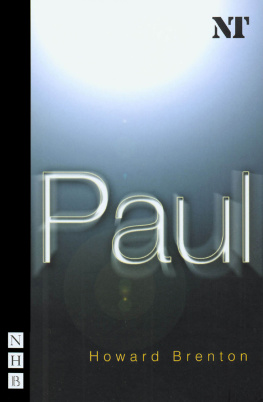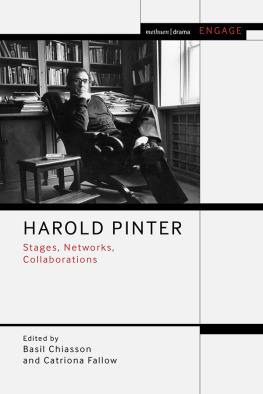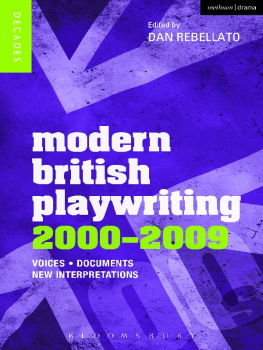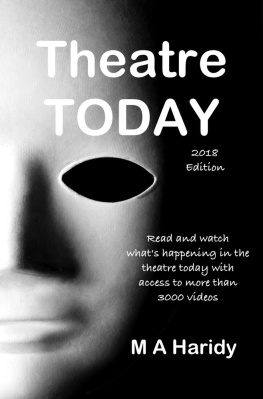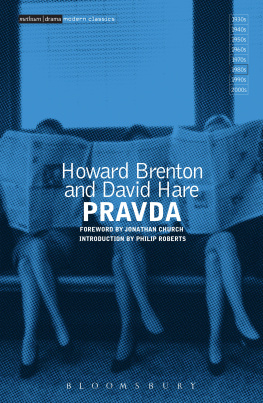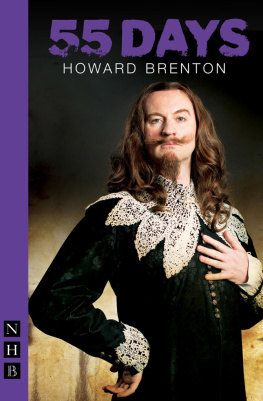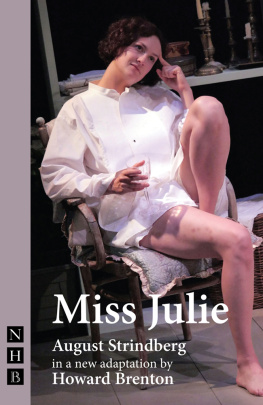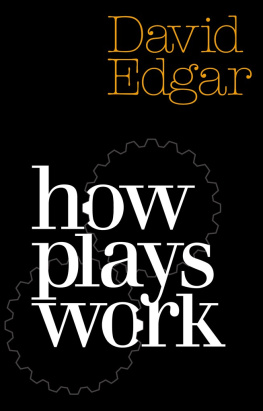MODERN BRITISH PLAYWRITING: THE 1970s
VOICES, DOCUMENTS, NEW INTERPRETATIONS
Chris Megson
Series Editors: Richard Boon and Philip Roberts

Contents
by series editors Richard Boon and Philip Roberts
This book is one of a series of six volumes which seek to characterise the nature of modern British playwriting from the 1950s to the end of the first decade of this new century. The work of these six decades is comparable in its range, experimentation and achievement only to the drama of the Elizabethan and Jacobean dramatists. The series chronicles its flowering and development.
Each volume addresses the work of four representative dramatists (five in the 20002009 volume) by focusing on key works and by placing that work in a detailed contextual account of the theatrical, social, political and cultural climate of the era.
The series revisits each decade from the perspective of the twenty-first century. We recognise that there is an inevitable danger of imposing a spurious neatness on its subject. So while each book focuses squarely on the particular decade and its representative authors, we have been careful to ensure that some account is given of relevant material from earlier years and, where relevant, of subsequent developments. And while the intentions and organisation of each volume are essentially the same, we have also allowed for flexibility, the better to allow both for the particular demands of the subject and the particular approach of our author/editors.
It is also the case, of course, that differences of historical perspective across the series influence the nature of the books. For student readers, the difference at its most extreme is between a present they daily inhabit and feel they know intimately and a decade (the 1950s) in which their parents or even grandparents might have been born; between a time of seemingly unlimited consumer choice and one which began with post-war food rationing still in place. Further, a playwright who began work in the late 1960s (David Hare, say) has a far bigger body of work and associated scholarship than one whose emergence has come within the last decade or so (debbie tucker green, for example). A glance at the Bibliographies for the earliest and latest volumes quickly reveals huge differences in the range of secondary material available to our authors and to our readers. This inevitably means that the later volumes allow a greater space to their contributing essayists for original research and scholarship, but we have also actively encouraged revisionist perspectives new looks on the older guard in earlier books.
So while each book can and does stand alone, the series as a whole offers as coherent and comprehensive a view of the whole era as possible.
Throughout, we have had in mind two chief objectives. We have made accessible information and ideas that will enable todays students of theatre to acquaint themselves with the nature of the world inhabited by the playwrights of the last sixty years; and we offer new, original and often surprising perspectives on both established and developing dramatists.
Richard Boon and Philip Roberts
Series Editors
September 2011
Richard Boon is Professor of Drama and Director of Research at the University of Hull.
Philip Roberts is Emeritus Professor of Drama and Theatre Studies at the University of Leeds.
I am grateful to my three academic colleagues who have contributed their excellent essays to this volume: Paola Botham, Richard Boon and Janelle Reinelt. Im deeply appreciative of their enthusiasm, expertise and critical rigour. Id also like to thank Richard (once again) and Philip Roberts for their invitation to write for the Modern British Playwriting series and their invaluable help and guidance as series editors throughout the project. Im indebted to Mark Dudgeon, Ross Fulton, Chris Parker and Neil Dowden at Methuen Drama, who have ensured a smooth and efficient publication process.
I would like to extend sincere thanks to Howard Barker, Ian Blower, Howard Brenton, David Edgar, David Gant, Tim Hardy, Barry Kyle, Peter McEnery, Ian McNeice, Ann Mitchell, Di Seymour, Mary Sheen and Kit Surrey for their time and generosity in contributing original material to this book. They are representatives of a theatrical generation of inspiring vitality and acumen. Id also like to acknowledge with appreciation the late James Aubrey.
Thank you to the following for their practical assistance and/or conversation in the course of my research for this book: Steve Barfield, Colin Chambers, Susan Croft, Sir Richard Eyre, Lynette Goddard, Jennifer Megson, Vivi Mellegard, Kaori Nakayama, Helen Nicholson, Dan Rebellato and Graham Saunders. I am grateful to Royal Holloway College for granting me a term of sabbatical leave to write this book and to the Drama departmental research fund for help with costs.
I was born at the start of the 1970s and some of my earliest memories are of power cuts and candlelight, the heat wave of 1976 and the voice of Karen Carpenter, the theme tune from The Wombles and staying up late to watch Starsky and Hutch the list goes on. This book is dedicated to my mum, dad and sister Nicola with whom I shared that great first decade.
Things we bought
Pocket calculators, digital watches, Polaroid cameras, microwave ovens, lava lamps, trim phones, home-brew kits, fondue sets, Ford Cortinas, Mateus Ros and Blue Nun wine, shag rugs, Portmeirion pottery, pet rocks, candy cigarettes, Space Hoppers, Matchbox toy cars, Sindy and Action Man dolls, Raleigh Chopper bicycles, Lego. Board games launched in the 1970s: Connect Four, Mastermind.
What things cost
In the early 1970s:

Family life
People are living longer and more people are choosing to live alone. Life expectancy in 1970: 68.7 years for men and 75 years for women (by 2008, it is 77.8 years for men and 81.9 years for women). In 1970, there are 340,000 first marriages in England and Wales (143,000 in 2007). Average household size is 2.9 people, with one-person households comprising 18 per cent of the total (by 2009: average household size is 2.4 people, one-person households comprising 29 per cent of the total). In 1971, the proportion of babies born to women aged under twenty-five in England and Wales is 47 per cent (by 2008: 25 per cent).
In 1970, nearly half of all households in Britain have no regular use of a car. Food and non-alcoholic drinks form the largest category of household expenditure (by 2008: housing, water and fuel are the largest categories). In 1970, 55 per cent of men and 44 per cent of women smoke cigarettes and smoking is permitted in all public spaces from train carriages to offices. Health warnings appear on packets from 1973 as smoking begins its historic decline.
Work life
Average weekly wage in the early 1970s: 32. In 1979, the typical weekly wage for a manual worker is 90 in industry, 54 in the public sector. Median monthly disposable income falls from 202 in 1974 to 187 in 1977 due to the economic crisis.
In 1968, 43 per cent of British workers are trade union members; by 1979, the figure is 55 per cent. The number of shop stewards (workplace union organisers) quadruples in the decade: there are around 300,000 by 1975. By the mid-1970s, the Transport and General Workers Union (TGWU), Britains largest trade union, has two million members. In 1976, more than half of Britons regard Jack Jones, then leader of the TGWU, as the countrys most powerful man.


